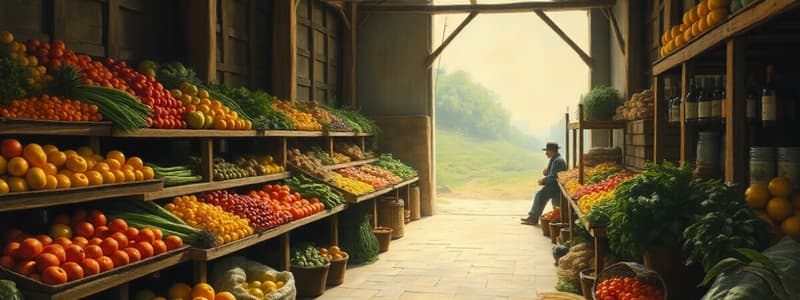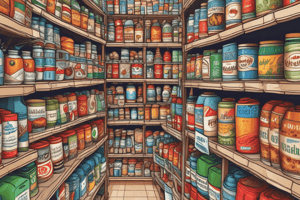Podcast
Questions and Answers
Which fruit is sensitive to ethylene and can produce it as well?
Which fruit is sensitive to ethylene and can produce it as well?
- Cantaloupe
- Kiwano (correct)
- Lychee
- Potatoes, storage
Which of the following fruits is treated with biphenyl that may cause odors to transfer to other products?
Which of the following fruits is treated with biphenyl that may cause odors to transfer to other products?
- Mandarin
- Cactus pears
- Tangerines (correct)
- Clementine
Which fruit group requires storage at 10°C (50°F) and 85-90% relative humidity?
Which fruit group requires storage at 10°C (50°F) and 85-90% relative humidity?
- Group 7
- Group 5 (correct)
- Group 6
- Group 4
Identify the fruit that is NOT typically sensitive to chilling injury.
Identify the fruit that is NOT typically sensitive to chilling injury.
What temperature range is preferred for fruits and vegetables that produce ethylene?
What temperature range is preferred for fruits and vegetables that produce ethylene?
Which group contains fruits and vegetables that produce ethylene during storage?
Which group contains fruits and vegetables that produce ethylene during storage?
What is the required relative humidity for fruits and vegetables in Group 1?
What is the required relative humidity for fruits and vegetables in Group 1?
Which of the following fruits is NOT mentioned in Group 1?
Which of the following fruits is NOT mentioned in Group 1?
Which of these fruits is sensitive to ethylene according to the specified groups?
Which of these fruits is sensitive to ethylene according to the specified groups?
At what temperature range should fruits and vegetables from Group 2 be stored?
At what temperature range should fruits and vegetables from Group 2 be stored?
Which of the following vegetables can be top-iced?
Which of the following vegetables can be top-iced?
What is the maximum relative humidity recommended for the storage of certain fruits and vegetables?
What is the maximum relative humidity recommended for the storage of certain fruits and vegetables?
Which fruit is specifically mentioned as having a restriction against sulfur dioxide?
Which fruit is specifically mentioned as having a restriction against sulfur dioxide?
Which of the following is NOT a group of vegetables that can be top-iced?
Which of the following is NOT a group of vegetables that can be top-iced?
Which of the following greens can be safely mixed with leeks?
Which of the following greens can be safely mixed with leeks?
Which of the following products is categorized as having a specific temperature requirement of 0 to 2°C?
Which of the following products is categorized as having a specific temperature requirement of 0 to 2°C?
Which of the following root vegetables can be top-iced?
Which of the following root vegetables can be top-iced?
What is the minimum recommended temperature for storing certain varieties of fruits and vegetables?
What is the minimum recommended temperature for storing certain varieties of fruits and vegetables?
Which fruit should be separated from pears during storage due to ethylene sensitivity?
Which fruit should be separated from pears during storage due to ethylene sensitivity?
Which of the following fruits can be injured by light freezing temperatures?
Which of the following fruits can be injured by light freezing temperatures?
What is the recommended relative humidity for storing fruits and vegetables in Group 7?
What is the recommended relative humidity for storing fruits and vegetables in Group 7?
Which of the following is a characteristic of grapefruits listed in the content?
Which of the following is a characteristic of grapefruits listed in the content?
Which vegetable is commonly grouped with tropical fruits in terms of storage temperature?
Which vegetable is commonly grouped with tropical fruits in terms of storage temperature?
What essential practice helps reduce losses of stored produce by minimizing pests?
What essential practice helps reduce losses of stored produce by minimizing pests?
Which of the following fruits is not mentioned as sensitive to freezing injury?
Which of the following fruits is not mentioned as sensitive to freezing injury?
Which of these fruits is listed under Group 7 for optimal storage conditions?
Which of these fruits is listed under Group 7 for optimal storage conditions?
What is the purpose of keeping the area around storage facilities clean?
What is the purpose of keeping the area around storage facilities clean?
Which material can be used to create effective rat guards?
Which material can be used to create effective rat guards?
What should be done with spoiled or infected produce during inspection?
What should be done with spoiled or infected produce during inspection?
How can disinfect reusable containers and sacks before reuse?
How can disinfect reusable containers and sacks before reuse?
What is the benefit of placing materials on the floor beneath sacks or cartons of produce?
What is the benefit of placing materials on the floor beneath sacks or cartons of produce?
Which of the following is recommended to prevent rodent entry in storage structures?
Which of the following is recommended to prevent rodent entry in storage structures?
What role does ventilation play in the storage of produce?
What role does ventilation play in the storage of produce?
Which of the following can be a cause of fungal infection in stored produce?
Which of the following can be a cause of fungal infection in stored produce?
Flashcards are hidden until you start studying
Study Notes
Compatibility Groups for Storage of Fruits and Vegetables
- Group 1: 0 to 2°C (32 to 36°F), 90-95% relative humidity. Products in group 1 produce ethylene. Examples include apples, grapes, peaches, pears, plums, berries (except cranberries), etc.
- Group 2: 0 to 2°C (32 to 36°F), 95-100% relative humidity. Some products in this group are sensitive to ethylene. Examples include amaranth, artichokes, asparagus, bean sprouts, beets, brussels sprouts, cabbage, carrots, cauliflower, etc.
- Group 3: 0 to 2°C (32 to 36°F), 65-75% relative humidity. Excessive moisture can damage these products. Examples include garlic and dry onions.
- Group 4: 4.5°C (40°F), 90-95% relative humidity. Examples include cactus leaves, cantaloupes, lemons, oranges, etc.
- Group 5: 10°C (50°F), 85-90% relative humidity. These products are sensitive to chilling injury. Examples include beans, cucumbers, eggplants, potatoes, squash, etc.
- Group 6: 13 to 15°C (55 to 60°F), 85-90% relative humidity. Products are sensitive to chilling injury and produce ethylene. Examples include avocados, bananas, grapefruit, papayas, etc.
- Group 7: 18 to 21°C (65 to 70°F), 85-90% relative humidity. These products are sensitive to ethylene. Examples include tomatoes, sweet potatoes, and watermelons.
Susceptibility to Freezing Injury
- Products that can be injured by one light freezing include apricots, asparagus, avocados, bananas, etc.
Storage Practices
- Regular inspections and cleaning of the storage structures and produce will help reduce losses.
- Storage facilities should be protected from rodents. Concrete floors, screens on windows, and rat guards can help prevent rodent entry.
- When inspecting stored produce, remove and destroy any spoiled or infected produce.
- Disinfect containers and sacks in chlorinated or boiling water before reuse.
- Placing materials on the floor beneath sacks or cartons of produce will help prevent fungal infection and improve ventilation.
Useful Materials for Storage
- Waterproof sheets
- Poles
- Wooden pallets
Studying That Suits You
Use AI to generate personalized quizzes and flashcards to suit your learning preferences.




